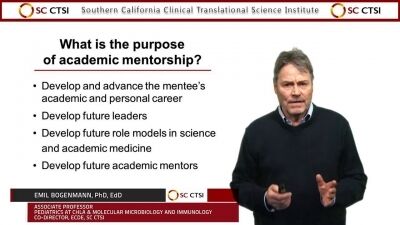Mentors can be crucial to the professional development of early-career clinical and translational researchers as they strive to develop expertise in a broad spectrum of areas -- academic, professional and personal. In this video, an SC CTSI lecturer explains how the mentor-mentee relationship can be managed to achieve the greatest personal and professional reward for both parties. The lecturer outlines the purpose of mentoring - beyond academic and scientific progress - such as the development of confidence, leadership and professional satisfaction. He discusses the responsibilities of both mentor and mentee, stressing the need for clear communication and mutual understanding of the expectations and needs each bring to the relationship. Common problems and complaints expressed by mentors and mentees are explored, as are characteristics of great mentors and mentees, in an effort to demonstrate how young researchers can optimize a uniquely valuable professional relationship that can span entire careers.
The Art of Mentorship and Being Mentored
A lecturer outlines strategies to ensure successful academic mentorships in clinical and translational science.
Course Syllabus/Topics
- Defining Mentorship: Its Purposes and Benefits
- Mentorship's Three Domains: Mentor, Mentee and Environment
- Benefits and Elements of Successful Mentorship
- Characteristics of a Great Mentor
- Characteristics of a Great Mentee
- Challenges in Mentorship
- Strategies for Ensuring Successful Mentorship
Recommended Resources
- Association of American Medical Colleges (AAMC) Compact with Postdoctoral Appointees and their Mentors
- Annual Individual Development Plan (IDP) For Life Science Graduate Students & Postdoctoral Trainees (modified from UC San Francisco)
Suggested Readings
- Russo G. Aspirations and Anxieties. Nature. 2011 Jul 28;475(7357):533-5.
- Schiermeir Q. Balancing Act. Nature. 2012 Dec 13;492:299-300.
- Gewin V. Under a Cloud. Nature. 2012 Oct 11;299-301.
FAQ
No. In addition to K Scholars, this course is open to faculty (who train and mentor graduate students and/or postdoctoral fellows in biomedical research), clinicians, community health workers, fellows, post-docs, TL1 and F trainees, as well as medical, OT/PT, pharmacy and other students who intend to conduct clinical and translational research.
